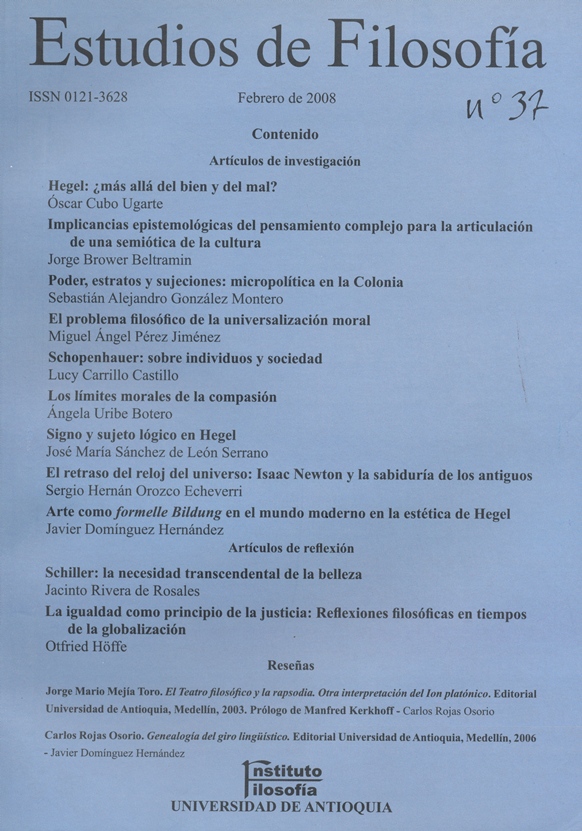Schopenhauer: On individuals and Society
DOI:
https://doi.org/10.17533/udea.ef.12725Keywords:
society, pessimism, individuals, morale, compasionAbstract
Schopenhauer`s Moral Philosophy is a critique to society that can be approached from two perspectives. On the one hand, from the bases of Metaphysical Pessimism where his Critique of the State finds support, in sum, conventions and prejudices which Schopenhauer calls the fundamental selfishness of the human condition. (1. The schopenhauerian concept of philosophy. 2. The critical character of his Moral Philosophy.) But, on the other hand, from what can be termed his effort to think a dialectical conciliation between vita activa et vita contemplative, where the ethical sense of his philosophy finds an indication of its possibilities when Aesthetics is to be considered. (3. The concept of compassion. 4. Schopenhauers actuality).
Downloads
References
ADORNO, T. W. Dialéctica negativa. Trad. de José María Ripalda y rev. de Jesús Aguirre. Taurus, Madrid, 1975.
BLOCH, E. Schopenhauers Pessimismus und die Potentialitäten der kategorie “Moglichkeit”. En: Ebeling H., und Lütkehaus, L. (eds.). Schopenhauer und Marx. Philosophie des Elends - Elend der Philosophie? Syndikat, Frankfurt, 1985.
GEHLEN, A. Die Resultate Schopenhauers. En: Salaquarda, J. (ed.). Schopenhauer. Wissenschaftliche Buchgesellschaft, Darmstadt, 1985.
HORKHEIMER, M. Die Aktualität Schopenhauers. En: Ebeling, H. und Lütkehaus, L. (eds.). Schopenhauer und Marx. Philosophie des Elends - Elend der Philosophie? Syndikat, Frankfurt, 1985.
HORKHEIMER, M. Pessimismus heute. En: Hübscher, A. (ed.). Schopenhauer- Jahrbuch für das Jahr. Verlag Waldemar Krauer, Frankfurt a. M., 1971.
HORKHEIMER, M. Schopenhauers Denken mi Verhältnis zu Wissenschaft und Religión. En: Salaquarda, S. (ed.). Schopenhauer. Wissenschaftliche Buchgesellschaft, Darmstadt, 1985.
HÜBSCHER, A. Von Hegel zu Heidegger. Gestalten und Probleme. Reclam, Stuttgart, 1961.
HÜBSCHER, A. Denker gegen den Strom. Schopenhauer: Gestern-Heute- Morgen. Bouvier, Bonn, 1973.
JAIN, E. Ästhetische Erfahrung und Mystik bei Schopenhauer. Schopenhauer- Studien. Wien, vol. 3, 1988. 63 Cf. ibíd., p. 130. También: Horkheimer, M. Pessimismus heute. En: Hübscher, A. (ed.). Schopenhauer- Jahrbuch für das Jahr. Verlag Waldemar Krauer, Frankfurt a. M., 1971, pp. 1 ss. 64 Cf. Nietzsche, F. Schopenhauer als Erzieher. En: Nietzsches Werke. Vol. 2. Alfred Kröner, Stuttgart, 1921, p. 266.
KÖTTELWESCH, C. (ed.). Wege zu Schopenhauer. Arthur Hübscher zu Ehren. Festgabe zum 80. Geburtstag. Brockhaus, Wiesbaden, 1978.
LÖHNEYSEN, W. Frhr. von. Die Überschrift des dritten Buches der ‘Welt als Wille und Vorstellung’. Schopenhauer-Studien. Wien, vol. 4, 1988.
MAGEE, B. Schopenhauer. Trad. de Amaia Bárcena. Cátedra, Madrid, 1991.
MOLLOWITZ, G. Die besondere Erkenntnisweise des Künstler, Heiligen, Philosophen. Schopenhauer-Jahrbuch. Frankfurt, vol. 65, 1984.
NIETZSCHE, F. Schopenhauer als Erzieher. En: Nietzsches Werke. Vol. 2. Alfred Kröner, Stuttgart, 1921.
PAETZOLD, H. Schopenhauere Motive in der Ästhetik des Neomarxismus. Schopenhauer-Studien. Wien, vol. 1/2, 1988.
PENZO, G. Fichte und Schopenhauer und das Nichts als Dimension des Heiligen. Schopenhauer-Studien. Wien, vol. 1/2, 1988.
POTHAST, U. Die eigentlich metaphysische Tätigkeit. Über Schopenhauers Ästhetik und ihre Anwendung durch Samuel Beckett. Suhrkamp. Frankfurt a. M, 1989.
SCHMIDT, A. Idee und Weltwille. Schopenhauer als Kritiker Hegels. Carl Hauser Verlag, München/Wien, 1988.
SCHOPENHAUER, A. Die beiden Grundprobleme der Ethik. En: Sämtliche Werke. Vol. 3. Ed. de Wolfgang Frhr. von Löhneysen. Suhrkamp, Frankfurt a. M., 1994.
SCHOPENHAUER, A. Parerga und Paralipomena 2. En: En: Sämtliche Werke. Vol. 5. Ed. de Wolfgang Frhr. von Löhneysen. Suhrkamp, Frankfurt a. M., 1994.
SCHOPENHAUER, A. Über den Wille in der Natur. En: Sämtliche Werke. Vol. 3. Ed. de Wolfgang Frhr. von Löhneysen. Suhrkamp, Frankfurt a. M., 1994.
SCHOPENHAUER, A. Die Welt als Wille und Vorstellung 1-2. En: Sämtliche Werke. Vol. 1-2. Ed. de Wolfgang Frhr. von Löhneysen. Suhrkamp, Frankfurt a. M., 1994.
SCHOPENHAUER, A. Metaphysik des Schönen. Ed. de Volker Spierling. Piper, München, 1985.
VEIT, O. Die Philosophie der Jahrhundertwende und die moderne Kunst. Schopenhauer-Jahrbuch. Festschrift zum 75. Geburtstag Arthur Hübschers. Frankfurt, vol. 53, 1972.
Downloads
Published
How to Cite
Issue
Section
Categories
License
Copyright (c) 2008 Lucy Carrillo Castillo

This work is licensed under a Creative Commons Attribution-NonCommercial-ShareAlike 4.0 International License.
Authors who publish with this journal agree to the following terms:
1. The Author retains copyright in the Work, where the term "Work" shall include all digital objects that may result in subsequent electronic publication or distribution.
2. Upon acceptance of the Work, the author shall grant to the Publisher the right of first publication of the Work.
3. The Author shall grant to the Publisher a nonexclusive perpetual right and license to publish, archive, and make accessible the Work in whole or in part in all forms of media now or hereafter known under a Creative Commons Attribution-NoCommercia-ShareAlike (CC BY-NC-SA 4.0), or its equivalent, which, for the avoidance of doubt, allows others to copy, distribute, and transmit the Work under the following conditions: (a) Attribution: Other users must attribute the Work in the manner specified by the author as indicated on the journal Web site;(b) Noncommercial: Other users (including Publisher) may not use this Work for commercial purposes;
4. The Author is able to enter into separate, additional contractual arrangements for the nonexclusive distribution of the journal's published version of the Work (e.g., post it to an institutional repository or publish it in a book), as long as there is provided in the document an acknowledgement of its initial publication in this journal;
5. Authors are permitted, and Estudios de Filosofía promotes, to post online the preprint manuscript of the Work in institutional repositories or on their Websites prior to and during the submission process, as it can lead to productive exchanges, as well as earlier and greater citation of published work (see The Effect of Open Access). Any such posting made before acceptance and publication of the Work is expected be updated upon publication to include a reference to the Estudios de Filosofía's assigned URL to the Article and its final published version in Estudios de Filosofía.















